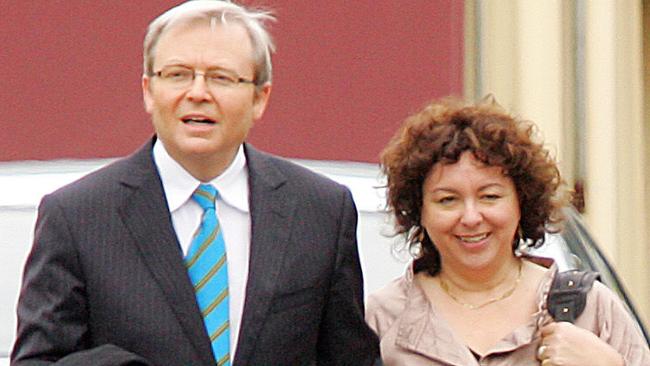Echoes of 2007 attack on Rudd over his wife’s business
Labor’s assault on Peter Dutton’s family trust echoes the 2007 attack on Kevin Rudd over the business interests of his wife.

Labor’s assault on Peter Dutton’s family trust holdings echoes the Coalition’s attack on Kevin Rudd over the business interests of his wife, Therese Rein, in the lead-up to the 2007 federal election.
Mr Dutton found himself under sustained attack yesterday over whether his family trust’s interests in two childcare centres breached section 44 of the Constitution, resulting in Attorney-General Christian Porter seeking advice from the Commonwealth Solicitor-General on the matter.
The issue is that the two childcare centres receive money from a nationwide childcare scheme.
In 2007, Mr Rudd and Ms Rein took steps to avoid any hint of controversy, even though Mr Rudd was never a direct beneficiary of his wife’s training business which had federal government contracts,
Ms Rein finalised the sale of her $170 million Australian business interests in December 2007, when her husband was sworn in as prime minister. “There is nothing that I want to do which complicates the decision for the Australian people at the next election,” Ms Rein said as she announced she would sell the business in the lead-up to the election.
“I have also now become convinced after deep and careful … consideration over many months that it would be perceived to be improper for my company to receive even one dollar from an Australian federal budget if my husband were to be elected prime minister.”
Legal academic George Williams believes Mr Dutton is unlikely to have breached section 44(v) of the Constitution, which says people cannot sit in parliament if they have any indirect pecuniary interest in any agreement with the commonwealth.
Professor Williams, dean of law at the University of NSW, believes Mr Dutton is probably safe because his interest in the family trust is less specific and involves revenue from a nationwide program.
For different reasons, he believes Mr Rudd would not have been in breach of section 44 even though the business of his wife largely depended on federal government contracts. He recalled Mr Rudd had nothing to do with Ms Rein’s business, which was run separately, and this would have been enough to remove him from the reach of section 44.
“If she was just an independent person running her own business, there’s no problem. If she was running the business through a family trust to which he was a beneficiary, then yes, there would have been a problem,” Professor Williams said.
In the lead-up to the 2007 election, Mr Rudd rejected assertions in an unauthorised biography that his political career had been bankrolled with profits from Ms Rein’s business in addition to funds MPs normally receive from taxpayers and their parties. Even if that had been the case, the High Court has been taking a strict approach to the enforcement of section 44 only since last year.
Before then, Professor Williams said, the High Court’s approach was determined by a 1975 decision of former chief justice Garfield Barwick which had read section 44(v) so narrowly as to leave little scope for enforcement.



To join the conversation, please log in. Don't have an account? Register
Join the conversation, you are commenting as Logout